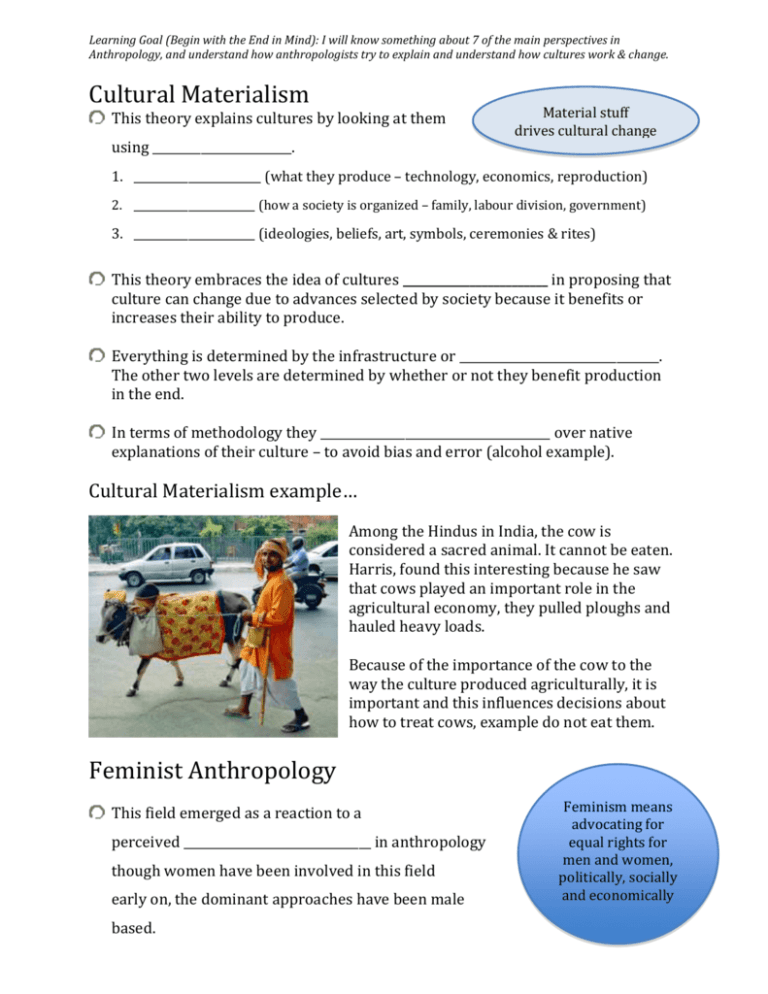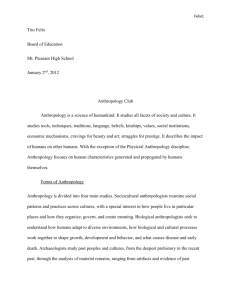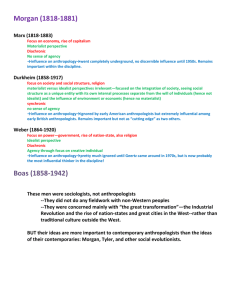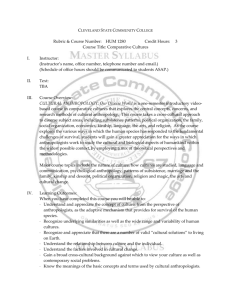File
advertisement

Learning Goal (Begin with the End in Mind): I will know something about 7 of the main perspectives in Anthropology, and understand how anthropologists try to explain and understand how cultures work & change. Cultural Materialism Material stuff drives cultural change using _______________________. more than ideas or thoughts 1. _____________________ (what they produce – technology, economics, reproduction) This theory explains cultures by looking at them 2. ____________________ (how a society is organized – family, labour division, government) 3. ____________________ (ideologies, beliefs, art, symbols, ceremonies & rites) This theory embraces the idea of cultures ________________________ in proposing that culture can change due to advances selected by society because it benefits or increases their ability to produce. Everything is determined by the infrastructure or _________________________________. The other two levels are determined by whether or not they benefit production in the end. In terms of methodology they ______________________________________ over native explanations of their culture – to avoid bias and error (alcohol example). Cultural Materialism example… Among the Hindus in India, the cow is considered a sacred animal. It cannot be eaten. Harris, found this interesting because he saw that cows played an important role in the agricultural economy, they pulled ploughs and hauled heavy loads. Because of the importance of the cow to the way the culture produced agriculturally, it is important and this influences decisions about how to treat cows, example do not eat them. Feminist Anthropology This field emerged as a reaction to a perceived _______________________________ in anthropology though women have been involved in this field early on, the dominant approaches have been male based. Feminism means advocating for equal rights for men and women, politically, socially and economically Learning Goal (Begin with the End in Mind): I will know something about 7 of the main perspectives in Anthropology, and understand how anthropologists try to explain and understand how cultures work & change. There are three waves of feminist anthropology 1. 1850 to 1920 _____________________________________ in ethnography (interviewer & interviewee) 2. 1920 to 1980 _______________________________________________ – avoid generalizations – reject the idea of an inherent dichotomy _______/__________ ________ /________ (________________________________________________________________) 3. 1980s onward not only focused on gender differences anymore, now _______________________________________________________ and __________ come into play in experiences, viewpoints, power &identity (_______________________________ _________________; not just between men and women) look at work, production, reproduction, sexuality and gender and the state Feminist anthropology has raised awareness regarding the role, status, and contributions of women to their societies Looks at how __________________________________________ rather than biologically Feminist Anthropology examples… 20s to 50s Mead & Benedict studies on culture, gender and personality 80s Gayle Rubin examines the issues of sex and gender, and brought gender back to the anthropological table by introducing the "sex /gender system": which also separates biology from behaviour. She challenges the idea that people are born either male or female only and looks at various “Queer subcultures”. Her approach is more inclusive of additional aspects of identity than gender equality. Culturally constructed ? or Biologically determined ? Learning Goal (Begin with the End in Mind): I will know something about 7 of the main perspectives in Anthropology, and understand how anthropologists try to explain and understand how cultures work & change. Post Modernism Post Modern anthropologists _______________________ _________________________________________________________ They are concerned with ____________________________ because _______________________________________________ _______________________________________is writing them o they ask the question can this truly be considered scientific? o it is impossible to have any ___________________________ about the world because ___________________________________________________________________________ or society They ask - Can an anthropologist _______________________________________________________ _____________________________________? To address this, postmodern anthropologists point out that ________________________ __________________________________________. All writing by any person is completed from _____________________________________________________________________________________________ __________________________. Anthropologists are essentially culture agents or brokers. Main points… o It is important to _____________________________________________________________________ o Recognizing the idea of _______________________________________________ is important o Rejection of science and _____________________________________________________________ o Rejection of ___________________________________________________________________________ Post Modern Anthropology example… This movement has led to a close look at how data is collected, interpreted and used. Nancy Scheper-Hughes studied mental illness among bachelor farmers in Ireland, during the decline of the agrarian economy and disintegration of rural family life. The book was published and people in Ireland were offended. She dealt with this by providing an update on the changes the community was undergoing – 20 years later. She also then wrote about the challenges and ethics of ethnography – noting that this becomes really important when communities that are being studied can subsequently read and critique the work. “Anthropologists, no less than any other professionals, should be held accountable for how we have used and how we have failed to use anthropology as a critical tool at crucial historical moments.” Nancy Scheper-Hughes Learning Goal (Begin with the End in Mind): I will know something about 7 of the main perspectives in Anthropology, and understand how anthropologists try to explain and understand how cultures work & change. Consolidation Consider all the theories and theorists… Who do you think agrees with whom? _________________________________________________________________________________________________ _________________________________________________________________________________________________ _________________________________________________________________________________________________ _________________________________________________________________________________________________ _________________________________________________________________________________________________ Who do you think would have a lively debate? _________________________________________________________________________________________________ _________________________________________________________________________________________________ _________________________________________________________________________________________________ _________________________________________________________________________________________________ _________________________________________________________________________________________________ Who would you like to chat with at the pub? _________________________________________________________________________________________________ _________________________________________________________________________________________________ _________________________________________________________________________________________________ _________________________________________________________________________________________________ _________________________________________________________________________________________________ Talk amongst yourselves








